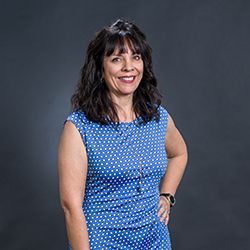AZ Higher Education Confronting Opioid Crisis
In response to the opioid epidemic, 18 undergraduate health educational and nurse practitioner programs in Arizona have developed a first-of-its-kind statewide curriculum that calls on all provider types to address the public health emergency.
On June 5, 2017, Gov. Doug Ducey declared a Public Health State of Emergency as more than two Arizonans were dying each day from opioid overdoses.
Educational leaders from 18 Arizona undergraduate health educational programs gathered and agreed that a change in education must be made. Over the course of four meetings, best practices were shared and educational theories, as well as national trends were reviewed.

Dr. Manriquez, interim associate dean for Clinical Curricular Affairs at the University of Arizona College of Medicine – Phoenix, was one of the faculty who represented the college in the curriculum planning. Others included Luke Peterson, MD, from Banner Family Medicine and associate program director of the college's Addiction Medicine Fellowship; Aram Mardian, MD, chief of the Chronic Pain Wellness Center at the Phoenix VA Health Care System. Dr. Mardian was the co-chair with Lisa Villaroel, MD, medical director for epidemiology and disease control for the Arizona Department of Health Services.
“Teaching future physicians and developing current physicians to understand alternative methods of management is important and when prescribing opioids for pain, to do so responsibly,” Dr. Manriquez said. “The medical, dental and even veterinary community have to take a good look at their practices and appreciate that we are a part of the problem occurring in society, but we are also the best equipped to be a huge part of the solution.”
The UA College of Medicine – Phoenix is currently undergoing an audit of its entire curriculum to identify where Opioid Action Plan curriculum already exists. The audit is being led by Cinda Stone, MEd, director of curricular management. The college already meets 43 of the 73 proposed statewide objectives.
“The College of Medicine – Phoenix is certainly at the forefront of providing this training,” Dr. Manriquez said. “We have had a strong presence from our faculty for years, but we have room for improvement, especially in teaching learners to critically evaluate systems and seek evidence-based solutions in treatment of pain and opioid use disorders.”
Dr. Manriquez said she believes the college is on a good pace to have all components implemented in the curriculum within the next year.
Programs Participating in Curriculum Development:
- University of Arizona College of Medicine – Phoenix.
- University of Arizona College of Medicine – Tucson.
- University of Arizona College of Nursing.
- Mayo Clinic School of Medicine – Phoenix Campus.
- Creighton University School of Medicine – Phoenix Regional Campus.
- Midwestern University – Arizona College of Osteopathic Medicine.
- Midwestern University – Arizona School of Podiatric Medicine.
- Midwestern University – Arizona Physician Assistant Program.
- A.T. Still University School of Osteopathic Medicine in Arizona.
- A.T. Still University School of Dentistry in Arizona.
- A.T. Still University Physician Assistants Degree Program.
- Northern Arizona University Post-Master’s Family Nurse Practitioner Certificate.
- Northern Arizona University Doctor of Nursing Practice.
- Northern Arizona University Physician Assistant Program.
- Arizona State University College of Nursing and Health Innovation.
- Grand Canyon University College of Nursing and Health Care Professions.
- University of Phoenix College of Health Professions.
- Southwest College of Naturopathic Medicine and Health Sciences.
About the College
Founded in 2007, the University of Arizona College of Medicine – Phoenix inspires and trains exemplary physicians, scientists and leaders to advance its core missions in education, research, clinical care and service to communities across Arizona. The college’s strength lies in our collaborations and partnerships with clinical affiliates, community organizations and industry sponsors. With our primary affiliate, Banner Health, we are recognized as the premier academic medical center in Phoenix. As an anchor institution of the Phoenix Bioscience Core, the college is home to signature research programs in neurosciences, cardiopulmonary diseases, immunology, informatics and metabolism. These focus areas uniquely position us to drive biomedical research and bolster economic development in the region.
As an urban institution with strong roots in rural and tribal health, the college has graduated more than 1,000 physicians and matriculates 130 students each year. Greater than 60% of matriculating students are from Arizona and many continue training at our GME sponsored residency programs, ultimately pursuing local academic and community-based opportunities. While our traditional four-year program continues to thrive, we will launch our recently approved accelerated three-year medical student curriculum with exclusive focus on primary care. This program is designed to further enhance workforce retention needs across Arizona.
The college has embarked on our strategic plan for 2025 to 2030. Learn more.